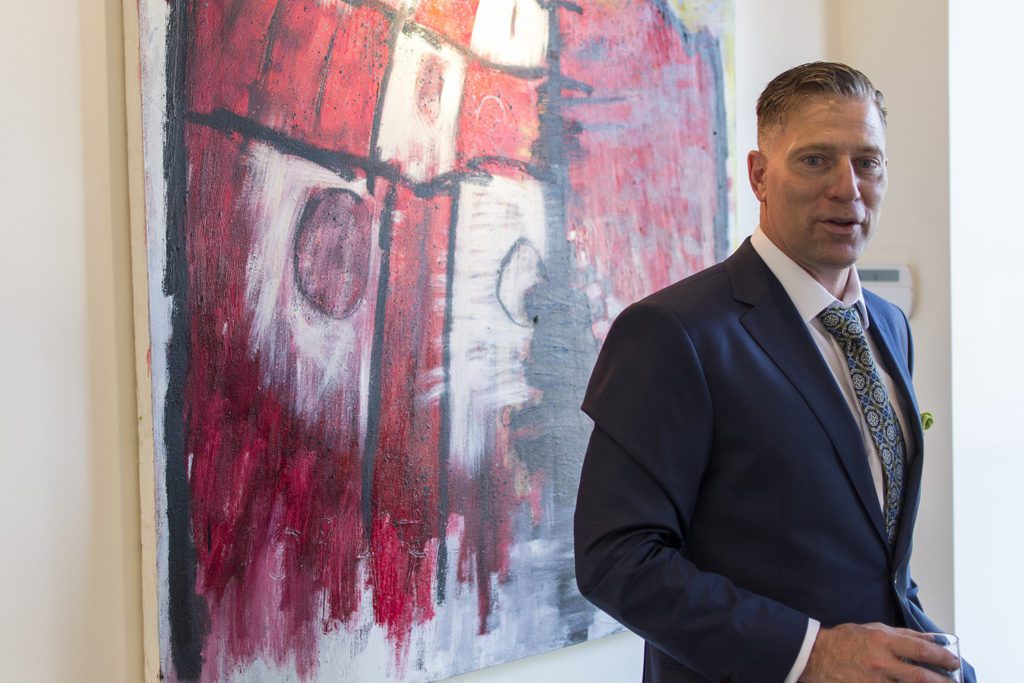Q&A With Artist and ‘War Story’ Author David Richardson
By • April 18, 2019 0 1099

There are novels about war and there are novels about art. But rarely are there novels about war and art.
This is what makes “War Story,” author David Richardson’s new novel, so unexpected, powerful and compelling. A decorated U.S. Marine Corps combat veteran born in 1965, Richardson is also a lifelong painter and longtime Washingtonian.
A semi-fictionalized memoir of his life as both a struggling painter in Georgetown and a soldier in the Iraq War, “War Story” is a never-before-seen portrait of the American warrior, a journey of blood, sweat and paint.
The Georgetowner sat down with Richardson to discuss the novel, the odd similarities of art and warfare and his affection for the Georgetown neighborhood.
An abstract painter and a soldier are unusual identities to square. How have these dueling pursuits informed each other?
David Richardson: If people weren’t always pointing out to me that there is a dichotomy in being a soldier and an artist, I’m not sure I would have ever recognized it. I’ve always thought art and war fit together perfectly.
A lot of famous 20th-century artists served in the military — Walter Gropius, Robert Rauschenberg, Richard Diebenkorn, Sol Lewitt.
And anyone who paints will tell you that the act of painting can feel like battle: aggressive, emotional, nerve-wracking, exhausting.
“War Story” is best described as autobiographical fiction — a novelization of your deployment in Iraq and your life as a painter. Why did you decide to fictionalize your experience, rather than write a traditional memoir?
Richardson: The first draft was a more traditional memoir. But I realized I could get to the heart of the story — the emotional truth
— with greater effect if I allowed it to evolve beyond the constraints of the “hard facts.” So I gave it some slack, let it breathe a little. It’s still my story. Its intentions are true, and in that sense it’s as honest as any memoir I could have written.
Why is man fascinated by war? That’s the crux of the book. Getting that right was more important to me than accurately reconstructing my memories.
The most unexpected aspect of this novel is how much space you devote to the story of your Iraqi counterpart, named Mujeed. You wrote nearly half of the book from his perspective.
Richardson: I dedicated so much time to him because few people have any idea how closely American soldiers lived and fought alongside Iraqis. I want the character of Mujeed to give readers a window into the soul of the Iraqi solider, as well as the universality of soldiering. I will never forget him. Sadly, he’s probably dead now.
You are deeply influenced by classic literature, “The Iliad” and “The Odyssey” in particular.
Is your novel a way of responding to it?
Richardson: I wrote “War Story” as an odyssey, and I did draw a lot from literature, though mostly unconsciously. Your earlier comparison to Achilles, for instance — it’s completely true, but I hadn’t been aware of it until you mentioned it.
Other references were more intentional, of course. “The Upturned Face” by Stephen Crane, the writings of Aristotle, even films like “Platoon” and “Cross of Iron” were all big inspirations.
Georgetown features heavily in the first half of the novel. From the waterfront to Martin’s Tavern, Georgetown Tobacco, even the old Chinese tea house and the university, you write about Georgetown with real affection. It’s a treat for any reader who knows the neighborhood.
Richardson: In Iraq, whenever I thought about home, I thought of Georgetown. I had an office in Foggy Bottom, and nearly every day I’d find an excuse to ride my bike into Georgetown. I have a lot of good memories here. And I’m still making them — I bring my boys here now.
And what a great setting for a novel. Everyone knows Georgetown. It’s mentioned in the same breath as Manhattan, Hyde Park or San Francisco. It’s nostalgic, yet timeless, and sort of aspirational — the kind of place that’s cozy in the winter and breezy in the summer, full of art, soul and intellectual life. In fact, it’s almost too nice to be in D.C.

